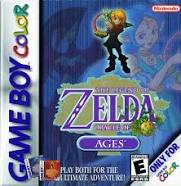Friday, April 28, 2017
The Legend of Zelda: Oracle of Ages
As you may have cleverly guessed, my current attempt is to play through all of the Zelda games. I am doing woefully poorly, having completed only the first game, Link to the Past, Ocarina of Time, Link's Awakening, A Link Between Worlds, Minish Cap, and Oracle of Ages. But I am trying! My current project is Oracle of Seasons, which will get a full write up when it is completed (probably a week or two out).
Oracle of Ages and Seasons has a lot going for it, and a lot to be concerned about. First, it's developed by Capcom, one of my favorite Nintendo third party developers. But, it's developed by Capcom, and Zelda has always been the supremely brilliant Miyamoto's baby! It's part of an ambitious two game set, developed a released together. But these ambitious programs can often fall short of their promise. It's built essentially on the architecture of the magnificent Link's Awakening, but in doing so risks being limited in its innovations. Ages in particularly operates with a gimmick shockingly similar to A Link to the Past (two parallel worlds that change subtly when you shift between them), yet this too makes it so that creating unique ground can be challenging.
So the Oracle games shot for the moon in a risk-filled environment. Did Ages make the risk worth it?
In my opinion, yes. For direct comparison's sake, I'd say that Ages is probably worse than Link' Awakening, but that's about as descriptive as saying that Scottie Pippen was a worse member of the Chicago Bulls than Michael Jordan. Without an objective measure of quality, and compared solely to one of the best handheld games ever, this is limited in meaning.
So what is great about Ages? First, the architecture of Link's Awakening was preserved, which allowed for some very interesting mechanics that even Link to the Past couldn't have accomplished. Foremost among these is the remarkable idea that Link doesn't always need to have his sword out. This means that if you want, you can use two unorthodox items in combination to solve challenging obstacles, like using the Roc's Feather in conjunction with Pegasus Seeds in order to move faster and jump over wider gaps. The presence of side scrolling underground areas like Link's Awakening also open up the gameplay a little, giving you an alternative means of gameplay. There is even a boss that was fought in this side scrolling style, and it was a really fun one, too.
Second, the sound track is really excellent, although tainted a bit by the fact that Oracle of Ages and Seasons share a good number of tracks together. Still, the chiptune tracks are solid through and through, and are so good that you don't mind hearing some rehashes when you switch to the other game in the duo.
Third, Ages manages to separate itself from its Zelda peers by having the most challenging puzzles to date, and having some of the most unorthodox boss fights in the series. These puzzles are mind-bendingly difficult at times, but are worth the payoff (usually). The boss fights are frequently resolved without using your sword at all, making the notion that this Zelda is more about brains than brawn all the more clear.
Fourth, and finally, the world is absolutely enormous, and you really get to double it due to being able to see the world in the past, as well as the present. This is the spirit of the world that Miyamoto envisioned with the original Zelda, but probably tripled in size. This accomplishment is really remarkable, particularly when considering that Capcom was developing two games this size at the same time!
I did have a few criticisms of the game, which are the reasons it doesn't quite match up to Link's Awakening. First, the fetch quests between dungeons are so long and confusing, with little guidance as to where to go, and two worlds to work through, that getting from dungeon to dungeon felt more challenging than fun.
Second, some of the dungeon designs were so cerebral that they evaded common sense, making my need to resort to guides far more frequent with this game than any other Zelda game than the first. A good example is in one of the dungeons, where you need to stand just far enough away from a crystal switch so that you're standing on the red/blue squares that raise, so that the squares will raise you along with them. I looked around that dungeon for probably 45 minutes before finally copping out and resorting to zeldadungeon.net (great site, by the way).
Third, for a game with more focus on puzzle solving than combat, it was really hard! I died probably 25-30 times in the game, which is more than I usually will in a standard Zelda. There were few hearts to refill life bars, and no bottles to hold fairies, really increasing the challenge. I'm not sure if I liked this or not, but in general I'd rather a game be a little too hard than too easy, so I'll put this in the "liked it sometimes and not others" category for now.
Anyway, Oracle of Ages is an excellent addition to anyone's Game Boy library. It's a rich system with a lot of games, but it's a must own for Game Boy enthusiasts, or those who love handheld gaming. I'd give it a 9.3/10.
-TRO
Subscribe to:
Post Comments (Atom)

No comments:
Post a Comment